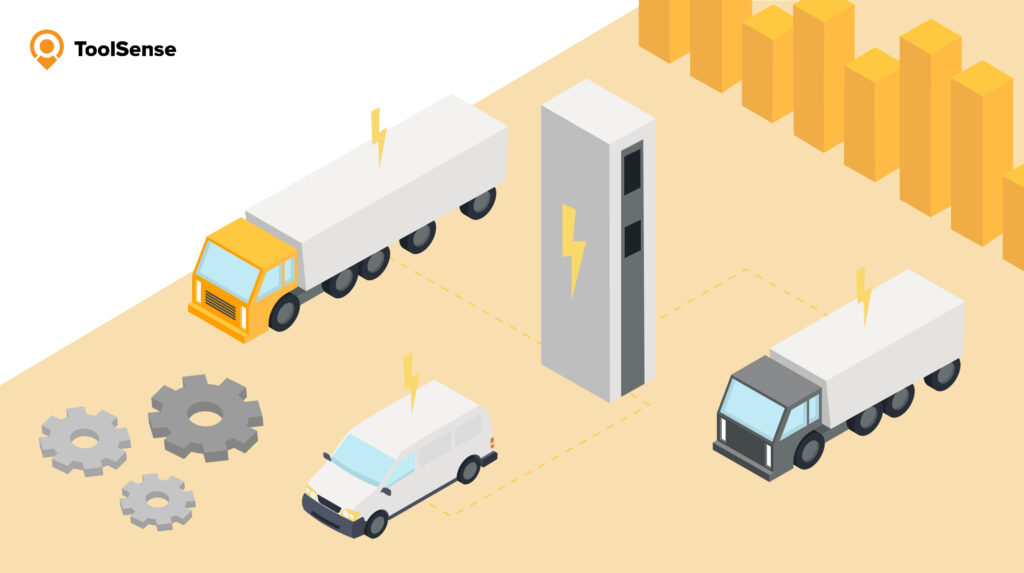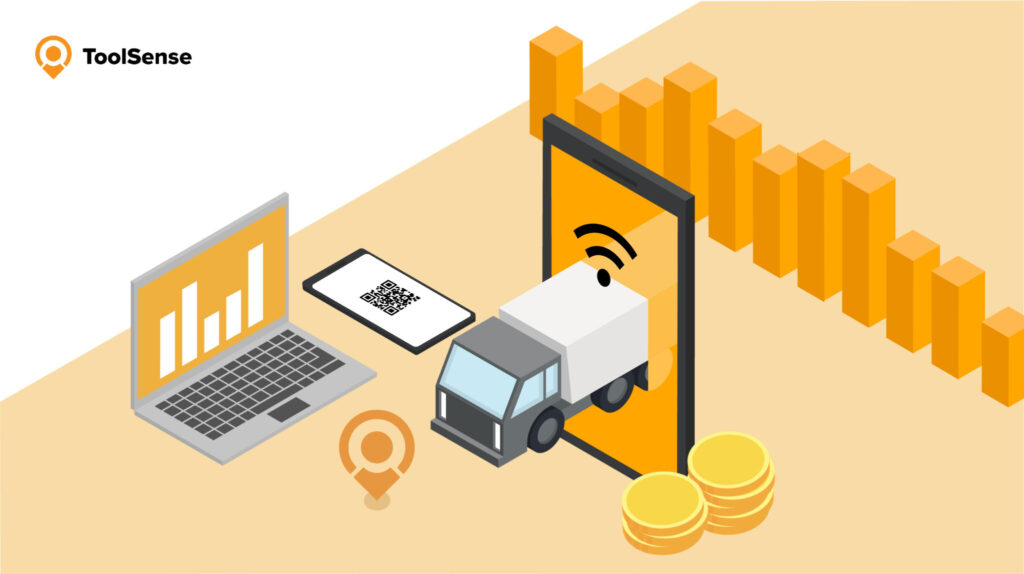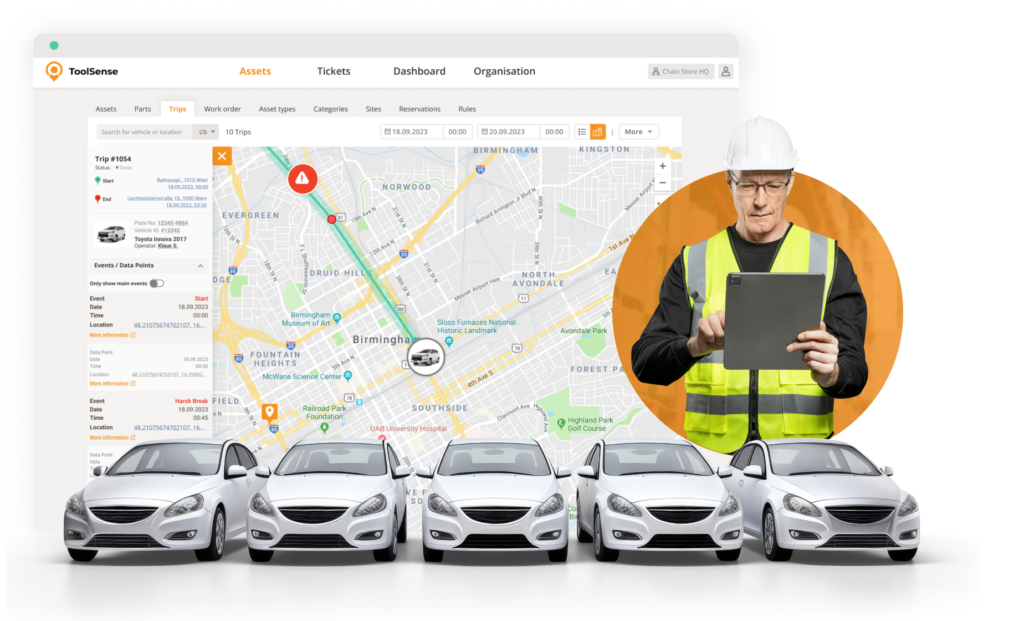Efficient EV fleet management, a term synonymous with electric vehicle fleet management, is fundamental for businesses transitioning to electric vehicles. It encompasses crucial considerations such as charging station placement, vehicle selection, and energy management, which are the pillars of a successful electrification strategy. Advanced software solutions play an emerging role in addressing these challenges, offering targeted insights into optimizing EV fleet operations.
This article cuts through the complexity and highlights the significance of these technological advancements. Dive into the essential aspects of EV fleet management and prepare your business for the eco-friendly road ahead with the aid of cutting-edge tools.
Key Takeaways
- Electric Vehicle Fleet Management entails the optimization of electric vehicle operations, focusing on charging infrastructure, battery life, and energy consumption, with benefits including lower fuel and maintenance costs.
- Successful EV fleet management requires a robust charging infrastructure, careful vehicle selection based on factors like range and cost, and efficient route planning to overcome challenges such as limited range and charging point availability.
- Emerging technologies, such as real-time monitoring and predictive analytics, are critical in modern EV fleet management, enabling operators to make data-driven decisions for vehicle maintenance, energy efficiency, and overall fleet operation.
- With the right EV fleet management software, you’ll get the most out of your EV fleet.
In a nutshell: What is Fleet Management? What is fleet electrification?
Fleet management is an all-encompassing approach to managing all fleet-related activities. It involves a range of tasks, including:
- Vehicle trip management and maintenance
- Route optimization
- Fuel management
- Driver management
- Compliance with regulations
- Accident management
- Asset tracking
These tasks are aimed at achieving operational efficiency and reducing costs. Fleet managers are at the forefront of this process, ensuring the smooth and effective functioning of fleet vehicles.
When it comes to managing electric fleets, software solutions like ToolSense become indispensable. They offer advanced capabilities in asset tracking and maintenance, which are vital for overseeing EV assets efficiently. With features such as real-time location tracking, usage monitoring, and predictive maintenance alerts, ToolSense provides a comprehensive platform that supports the unique demands of electric fleet management. This enables fleet managers to maintain optimal vehicle health, manage energy consumption, and ensure regulatory compliance more effectively.

Fleet electrification refers to the process of transitioning from traditional fuel vehicles to electric vehicles (EVs). In the pursuit of a greener future, this shift is increasingly crucial. Electric vehicle fleets are at the vanguard of this electrification movement, offering a sustainable alternative to conventional commercial fleets and setting the stage for a cleaner, more efficient future.
What is Electric Vehicle Fleet Management about?
Electric Vehicle Fleet Management focuses on the unique challenges and opportunities presented by electric vehicles. It involves optimizing the operations, charging, and maintenance of electric vehicle fleets. Unlike managing traditional Internal Combustion Engine (ICE) vehicles, this requires specific attention to aspects like battery life, charging infrastructure, and energy consumption.
But why go electric? Beyond the clear environmental benefits, EV fleets bring operational advantages. They typically have lower fuel costs and require less maintenance than ICE vehicles, leading to substantial cost savings in the long term. Furthermore, advancements in EV technology are continuously enhancing vehicle range and performance, making EVs an increasingly viable option for fleet operations.
Essentials of EV Fleet Management
To effectively manage an EV fleet, there are several key factors to consider. These include establishing a robust charging infrastructure and energy management, selecting the right vehicles, and planning routes efficiently. Each of these elements plays a critical role in optimizing the performance and operational efficiency of an electric fleet.
Charging Infrastructure and Energy Management

A robust charging infrastructure is integral to EV fleet success. Effective energy management strategies are essential for vehicle charging, involving smart power distribution to avoid peak charges, utilizing renewables, and managing charging schedules with software for load balancing.
Fleet managers can use a combination of overnight charging at facilities and public fast-charging stations for flexibility. It’s important to understand the costs associated with public charging and to use data strategically for optimizing EV and charger usage. Collaboration with utilities can reveal special EV programs and regulatory considerations.
Vehicle Selection
Choosing the right electric vehicles for a fleet is a pivotal decision. It requires evaluating each vehicle’s range, battery capacity, and overall cost-effectiveness. EV fleet managers benefit from fewer moving parts and fluids in electric vehicles, which can lead to savings, especially for high-mileage fleet vehicles.

It’s also important to consider the following factors when selecting vehicles for your EV fleet:
- Daily range requirements
- Total cost of ownership
- Dwell time
- Miles per kilowatt hour
- Charge times
- Load needs
- Replacement windows for current assets
Taking these factors into account will ensure a proper match for your applications.
Route Planning

Efficient route planning is essential for EV fleet management. It involves considering the availability of charging points, the range limitations of vehicles, and anticipated energy use. By doing so, you can optimize operational effectiveness and ensure your vehicles always have sufficient charge for their routes.
Traffic conditions and weather variations significantly influence EV range, requiring route planning to account for these variables for accurate energy consumption estimates. By using predictive analytics and considering historical traffic patterns, EV fleet managers can optimize routes to improve energy efficiency, reduce impacts on the grid, and ensure reliable service.

Preventive Maintenance and Diagnostics
Regular preventive maintenance and diagnostics are vital to keep an EV fleet running smoothly. This includes monitoring battery health, ensuring software is up to date, and checking the integrity of electrical systems. Proactive maintenance can prevent costly downtimes and extend the lifespan of the fleet.

Data Analytics and Insights
Data analytics play a pivotal role in EV fleet management. By analyzing vast amounts of data from vehicles, charging stations, and operations, fleet managers can gain valuable insights into energy consumption patterns, charging behavior, and vehicle performance. This data-driven approach enables informed decision-making and continuous improvement across all aspects of EV fleet management.

Compliance and Reporting
Compliance with local regulations and environmental standards is becoming increasingly important for EV fleets. Fleet managers must ensure that their operations adhere to emission standards, energy usage regulations, and reporting requirements. By doing so, they not only avoid legal penalties but also contribute to the global effort of reducing the environmental impact of transportation.
The Role of Technology in EV Fleet Management
The advent of digital technology has become a cornerstone in the realm of EV fleet management. Leveraging advancements such as real-time monitoring and predictive analytics, these technological innovations are transforming the management practices of electric vehicle fleets and benefitting fleet electrification.
Real-Time Monitoring
Real-time monitoring is a game-changer in EV fleet management. It leverages GPS and onboard diagnostics to monitor real-time data such as:
- Location
- Speed
- Idle time
- Charge levels
- Tire pressure
This provides EV fleet managers with a wealth of information to optimize fleet usage and energy consumption.
Incorporating live traffic and weather data into electric vehicle fleet management can help determine the most efficient routes, account for potential impacts on range, and adapt to changing conditions in real-time. This approach enables managers to optimize fleet usage and ensure vehicles are ready for operation without the need to rely on external software systems.

Predictive Analytics
Predictive analytics is another powerful tool in the arsenal of EV fleet management. It uses historical data and artificial intelligence to estimate future energy requirements, enhance charging schedules, and account for individual driver behaviors, contributing to more efficient EV fleet operations.
Predictive maintenance in EV fleet management utilizes real-time vehicle diagnostics to forecast and alert managers about maintenance needs, thereby preventing failures and extending vehicle life. Telematics and AI-driven platforms provide fleet operators with actionable insights from real-time data, enabling proactive maintenance, charging management, and streamlined transition to electric fleets.
Cost Savings and Environmental Benefits
The benefits of transitioning to EV fleets are twofold: cost savings and environmental impact. Electric vehicles offer lower operating costs, with maintenance costs for light-duty all-electric vehicles averaging about 3 cents per mile. This, coupled with lower fuel costs, results in substantial cost savings in the long term.
On the environmental front, EVs offer several benefits:
- They significantly reduce our carbon footprint
- They conserve natural resources by decreasing oil dependency
- They mitigate the ecological impact of fuel transportation
- The integration of renewable energy sources such as solar into the U.S. power grid is making electricity an increasingly cleaner source for powering electric vehicles.
Tools and Resources for Effective EV Fleet Management
To streamline and enhance EV fleet management, operators can leverage a range of tools and resources, including ev fleet management systems, advanced software solutions, telematics providers, comprehensive systems that can manage significant volumes of data, and real-time monitoring of vehicle health and location. These tools and resources can help operators effectively manage their EV fleets.

What should EV fleet operators care about?
For EV fleet operators, it’s crucial to focus on several key factors. These include charging infrastructure, vehicle selection, and route planning. Each of these elements plays a critical role in optimizing the performance and operational efficiency of an electric fleet. In addition to these factors, EV fleet operators should consider aspects like:
- EV charging infrastructure operational excellence
- Self-service tools for drivers and fleet managers
- Energy optimization
- EV roaming capability
- Financial management
Electric Vehicle Fleet Management Software
Electric Vehicle Fleet Management Software plays an integral role in managing data and monitoring vehicle health and location in real-time. Some key features of this software include:
- Data management capabilities
- Real-time vehicle monitoring
- Vehicle health monitoring
- Location tracking
Telematics providers and OEMs offer advanced software solutions capable of managing significant volumes of data. Such software provides EV fleet managers with deeper insights into charging patterns, vehicle diagnostics, and fleet-wide energy usage, which are essential for making data-driven management decisions. They also enable the collection and transmission of real-time vehicle data, offering EV fleet managers deeper insights into charging patterns, vehicle diagnostics, and fleet-wide energy usage, which are essential for making data-driven management decisions.
Our Top Picks
If you are interested in further exploring different EV fleet management software solutions, you may do so in our article “Top EV Fleet Management Software for Optimizing Your Fleet“.
Introducing ToolSense: Your Partner in EV Fleet Management
Navigating the essentials of EV fleet management requires not just expertise, but also the right tools at your disposal. ToolSense offers a comprehensive EV fleet management software solution designed to streamline the management of your electric vehicle fleet. From charging infrastructure and energy management to vehicle selection, route planning, and beyond, ToolSense is engineered to keep your fleet operating at its peak.
Why Choose ToolSense?
- Smart Charging and Energy Management: Optimize your charging schedules and manage energy consumption efficiently with ToolSense. Our software provides actionable insights to utilize charging infrastructure smartly, reducing operational costs.
- Vehicle Performance Insights: Make informed decisions with detailed analytics on each vehicle’s performance, including range, battery health, and energy usage. ToolSense helps you select the right vehicles for your fleet and monitor their efficiency over time.
- Advanced Route Planning: With ToolSense, planning efficient routes becomes straightforward. Our predictive analytics consider charging point availability, traffic conditions, and weather variations, ensuring your fleet operates smoothly and reliably.
- Preventive Maintenance Alerts: Stay ahead of maintenance needs with real-time diagnostics and predictive maintenance alerts. ToolSense keeps your fleet on the road by preventing unexpected downtimes.
- Compliance and Reporting Made Easy: Ensure your fleet complies with all local regulations and environmental standards. ToolSense simplifies compliance and reporting, helping you maintain a green and efficient fleet.

Embark on a journey towards optimal EV fleet management with ToolSense. Experience firsthand how our platform can transform your operations. Sign up for a free trial or schedule a free demo today, and take the first step towards a more efficient, sustainable, and cost-effective fleet.
Conclusion: The Future of Fleet Management is Electric – and Digitalized
In conclusion, the future of fleet management is electric and digitalized. As the world moves towards a more sustainable future, electric fleets are leading the charge. The role of technology in optimizing operations, coupled with the significant cost savings and environmental benefits, make EV fleet management an exciting and rewarding field. The road to fleet electrification may have its challenges, but with the right tools, strategies, and resources, you can navigate the journey with confidence.
ToolSense is trusted by 700+ companies



Frequently Asked Questions
What is fleet management in EV?
Fleet management in electric vehicles involves overseeing the charging needs of fleet drivers and electric vehicles, as well as optimizing the EV charging infrastructure. It also includes tracking and monitoring electric fleet operations to improve productivity and mitigate expenses.
Who has the largest EV fleet in the world?
China has the largest EV fleet in the world, with over 11 million electric cars at the end of 2022 and 20.4 million plug-in passenger cars as of December 2023.
Who are EV fleet operators or fleet managers?
EV fleet operators are responsible for managing a company’s electric vehicle fleet, which includes monitoring performance data, developing charging infrastructure, and studying driver behavior to improve fleet operations by reducing costs and managing vehicle charging stations.
How do you manage electric fleet?
To manage an electric fleet, analyze EV charging patterns and power requirements, track charging at the vehicle level, and quantify electricity demand by time and location. This information will help in planning future infrastructure and outlining changes in energy demand.
What are some benefits of electric vehicles?
Electric vehicles offer improved ergonomics, reduced noise pollution, and government funding incentives, making them a favorable choice for environmentally conscious and cost-effective transportation.







